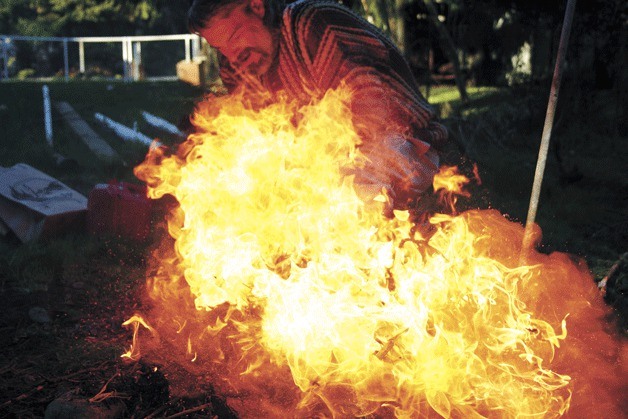The founder of Whidbey’s first medical marijuana co-op followed through on his pledge to destroy his supply of medical marijuana.
Following perceived threats to his wife and himself, Captn Blynd stacked 11 juvenile and mature plants and a kilogram jar full of a half-pound of dried marijuana bud on top of a burn pile outside his home on Tuesday, poured a fifth of Monarch 151 rum tincture on it and drenched the pot with gasoline.
“Do I look like a rich guy to you?” Blynd asked.
“Somehow I don’t think I am. This is plant matter. It’s not money, it’s not power, it shouldn’t reflect wealth. It’s legalized to make sick people feel better. That’s what it did for me.”
Then he watched his former dream of a medical marijuana cooperative go up in flames.
“I’ve got nothing in the house anymore, guys,” Blynd said to reporters watching.
Blynd created a buzz on South Whidbey late last month when he publicly announced his plan to start a medical marijuana cooperative, called MedBot, out of his Freeland home. He vowed earlier this week to put a match to his medical marijuana, however, after critics online questioned his motives and added unflattering comments to his Facebook page.
The burning of the pot pile was a modest spectacle.
Sunshine streaked through the alder trees behind Blynd’s house and the sun rays pierced through the smoke as it whipped around with each soft gust of wind. Blynd stoked the burning pile of cannabis with a metal poker, occasionally kneeling down to restack the plants that were still green.
Blynd estimated the burning pile of plants to be worth as much as $12,000. A CNBC report on 12 types and costs of different medical marijuana strains valued an ounce to range from
$300 to $500.
A website called UnitedStatesDrugTrends.com listed Washington’s “street” price for bud from British Columbia at $325 to $400 an ounce, and $500 to $700 for a pound of Mexican marijuana.
Blynd didn’t burn everything, however.
“My reserves are now kept under lock and key in a safe deposit box,” he said.
The pot pyre drew few onlookers. Three drivers crept by Blynd’s property and looked to see the source of the smoke now drifting high above the trees. No neighbors or passersby stopped to observe, however.
Blynd pointed to two shiny black motion-sensor lights he recently installed for security.
“We’re not particularly concerned with the threats,” Blynd said, “now that I’ve burned my plants.”
Now, he said, he planned to restructure his “utopian” co-op idea into a nonprofit, where all profit is given to a community food bank. His plans include finding “respectable, responsible people in the community,” to counter what he called the look of someone listening to a crazy person.
Blynd also said he wants to reach out and involve the most vocal opponent to add accountability and credibility to this new organization.
He said he has no remorse or regret about burning the plants or proposing the co-op.
“It’s just a plant,” Blynd said.



